新概念2教案第一课
新概念2册第一课教案
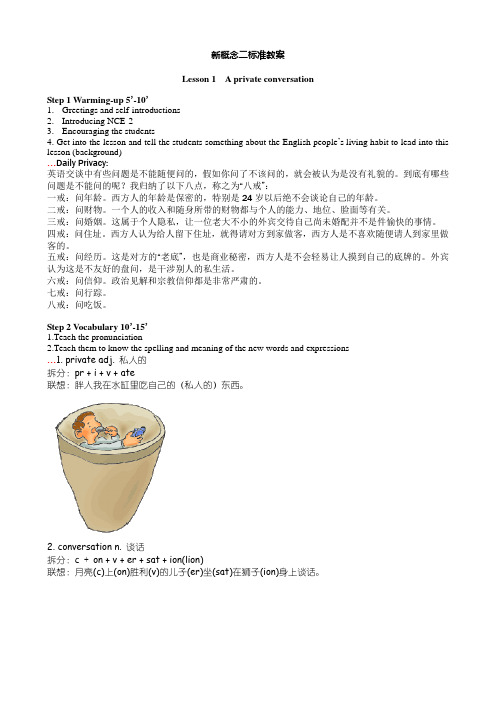
新概念二标准教案Lesson 1 A private conversationStep 1 Warming-up 5’-10’1.Greetings and self-introductions2.Introducing NCE-23.Encouraging the students4. Get into the lesson and tell the students something about the English people’s living habit to lead into this lesson (background)…Daily Privacy:英语交谈中有些问题是不能随便问的,假如你问了不该问的,就会被认为是没有礼貌的。
到底有哪些问题是不能问的呢?我归纳了以下八点,称之为“八戒”:一戒:问年龄。
西方人的年龄是保密的,特别是24岁以后绝不会谈论自己的年龄。
二戒:问财物。
一个人的收入和随身所带的财物都与个人的能力、地位、脸面等有关。
三戒:问婚姻。
这属于个人隐私,让一位老大不小的外宾交待自己尚未婚配并不是件愉快的事情。
四戒:问住址。
西方人认为给人留下住址,就得请对方到家做客,西方人是不喜欢随便请人到家里做客的。
五戒:问经历。
这是对方的“老底”,也是商业秘密,西方人是不会轻易让人摸到自己的底牌的。
外宾认为这是不友好的盘问,是干涉别人的私生活。
六戒:问信仰。
政治见解和宗教信仰都是非常严肃的。
七戒:问行踪。
八戒:问吃饭。
Step 2 Vocabulary 10’-15’1.Teach the pronunciation2.Teach them to know the spelling and meaning of the new words and expressions…1. private adj. 私人的拆分:pr + i + v + ate联想:胖人我在水缸里吃自己的(私人的)东西。
新概念英语第二册第一课详细教案
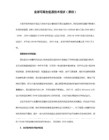
语一般为名词、代词或名词短语,通常位于动词之前。动词必须
“一致”,所以主语决定动词的单复数形式(如 I am, you are, he
。宾语一般为名词、代词或名词短语。在主动句中,宾语一般位
副词时,地点副词的一般位置是在方式副词
通常我们讲
be动词的适当形式填空。
2 / 7
Yesterday was______ the first of
All the students __are____ very excited.
______________________________________________
上教堂,去做礼拜 (cf.第1册第68课at school, at church;
1册第85课have been to school/church)
座位很好
一般指戏院、汽车等配置的固定座位,也可以抽象地表示“座位”
汽车的前座
请坐。
戏很有意思。
属于现在分词形式的形容词,意思是“使人感兴趣”。
fall sick。
4 / 7
上星期我去看戏。
句首的“Last week”点明叙述的事情发生的时间是上星期。因此整
(包括过去进行时),直接引语部分的
动词go的原义是离开一个地方去另一个地方,与介词to连用后,
请注意在以下的短语中名词前通常不加冠词:
上学
上床睡觉
1 / 7
:
( he, she, it,
,动词的词尾要加-S。(一般的动词词尾+S。以sh/ch/s/x结尾的
+es.以辅音字母Y结尾的把Y变成i,+es。辅音字母+o结尾的+es.)
新概念2第一课教案
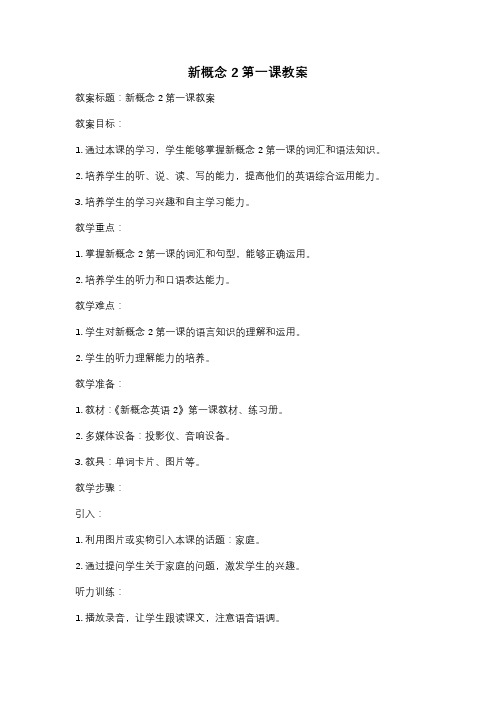
新概念2第一课教案教案标题:新概念2第一课教案教案目标:1. 通过本课的学习,学生能够掌握新概念2第一课的词汇和语法知识。
2. 培养学生的听、说、读、写的能力,提高他们的英语综合运用能力。
3. 培养学生的学习兴趣和自主学习能力。
教学重点:1. 掌握新概念2第一课的词汇和句型,能够正确运用。
2. 培养学生的听力和口语表达能力。
教学难点:1. 学生对新概念2第一课的语言知识的理解和运用。
2. 学生的听力理解能力的培养。
教学准备:1. 教材:《新概念英语2》第一课教材、练习册。
2. 多媒体设备:投影仪、音响设备。
3. 教具:单词卡片、图片等。
教学步骤:引入:1. 利用图片或实物引入本课的话题:家庭。
2. 通过提问学生关于家庭的问题,激发学生的兴趣。
听力训练:1. 播放录音,让学生跟读课文,注意语音语调。
2. 播放录音,学生听录音并完成相关的听力练习。
3. 分组进行对话练习,模仿录音中的对话内容,练习听力和口语表达能力。
语言知识讲解:1. 教师介绍本课的重点词汇和句型,并进行解释和示范。
2. 学生跟读词汇和句型,进行口语练习。
语法练习:1. 学生根据教师的指导,完成相关的语法练习。
2. 教师对学生的练习进行纠正和指导。
拓展活动:1. 学生分组进行角色扮演,模拟对话情景,练习语言交际能力。
2. 学生自由发挥,用所学知识编写小短文,展示他们的写作能力。
总结:1. 教师对本课的重点内容进行总结,并进行复习。
2. 学生进行小结,回答教师提出的问题。
作业布置:1. 布置课后作业,包括完成练习册相关练习、背诵课文等。
2. 鼓励学生自主学习,提供相关学习资源和建议。
教学反思:1. 教师对本节课的教学效果进行评估和反思。
2. 教师根据学生的反馈和表现,调整教学策略和方法。
注:以上教案仅为示例,实际教案编写时应根据具体教学内容和学生特点进行调整和完善。
教案新概念英语第二册标准教案第一课
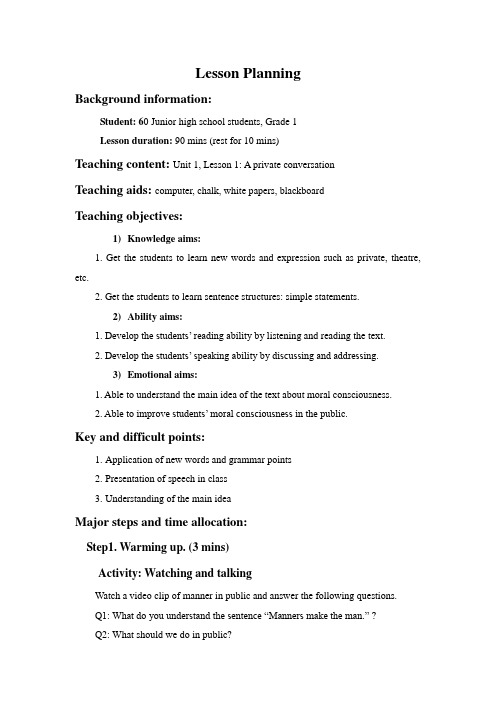
Lesson PlanningBackground information:Student: 60 Junior high school students, Grade 1Lesson duration: 90 mins (rest for 10 mins)Teaching content: Unit 1, Lesson 1: A private conversationTeaching aids: computer, chalk, white papers, blackboardTeaching objectives:1)Knowledge aims:1. Get the students to learn new words and expression such as private, theatre, etc.2. Get the students to learn sentence structures: simple statements.2)Ability aims:1. Develop the students’ reading ability by l istening and reading the text.2. Develop the students’ speaking ability by discussing and addressing.3)Emotional aims:1. Able to understand the main idea of the text about moral consciousness.2. Able to improve students’ moral consciousness in the publi c.Key and difficult points:1.Application of new words and grammar points2.Presentation of speech in class3.Understanding of the main ideaMajor steps and time allocation:Step1. Warming up. (3 mins)Activity: Watching and talkingWatch a video clip of manner in public and answer the following questions.Q1: What do you understand the sentence “Manners make the man.” ?Q2: What should we do in public?Step2. Pre-reading. (3 mins)Activity: Listening.Listen to the tape and then answer the question.Q: Why did the writer complain to the people behind him?Step3. While-reading. (10 mins)Activity 1: Skimming. (4 mins)Read the whole text and answer the following questions.Q1: What is the writing style of the text, narrative writing or descriptive writing?Q2: What is the general idea of the text?Activity 2: Scanning. (6 mins)Scan the text and complete the following tabulation.6 1 2 3 4 5 6When? Who?which?what? Action Who?which?what?How? Where? When?Last week I went to thetheatreI had a verygood seatThe play was veryinterestingI did notenjoythe playA young man and a young womanweresittingbehindmeThey weretalkingloudlyActivity 3: Close reading. (24 mins)1)Vocabulary and phrase.private adj.私人的conversation n.对话theatre n.戏院attention n.注意bear v.容忍turn round 转身pay attention注意none of your business不关你的事2)Sentence structures.1.Simple statements: A statement that tells us about one thing is a simple statement.2.Word order of simple statements: The order of words in a statement can affect the meaning of the statement.3)The tense.1.the past tense2.past continuous tense3.the present tense4)Main idea .Summarize the main idea of this text: Good manners in public are very important.Have a short break. (10 mins)Step4. Post-reading. (38 mins)Activity1. Make a short speech. (15 mins)Make a short speech about manners in public according to the following key words:speak loudly, rudely, knock at the door, spit, smoke, lady first...Activity2. Group work. (10 mins)Discuss with your partner “What did you do yesterday after school?”Use the simple statement to express your idea with right tense.Activity3. Exercise. (13 mins)Do exercise B on your textbook and then we will check it.Homework. (2mins)Finish the rest of exercises on your textbook and preview the next text.。
新概念第二册第一课教案
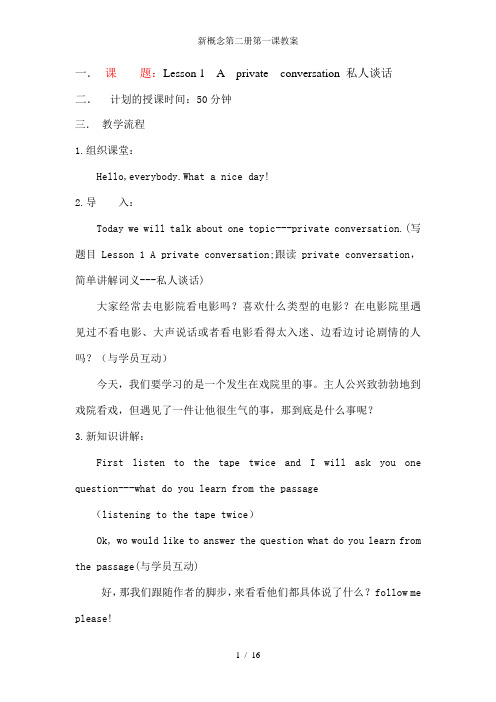
一.课题:Lesson 1 A private conversation 私人谈话二.计划的授课时间:50分钟三.教学流程1.组织课堂:Hello,everybody.What a nice day!2.导入:Today we will talk about one topic---private conversation.(写题目Lesson 1 A private conversation;跟读private conversation,简单讲解词义---私人谈话)大家经常去电影院看电影吗?喜欢什么类型的电影?在电影院里遇见过不看电影、大声说话或者看电影看得太入迷、边看边讨论剧情的人吗?(与学员互动)今天,我们要学习的是一个发生在戏院里的事。
主人公兴致勃勃地到戏院看戏,但遇见了一件让他很生气的事,那到底是什么事呢?3.新知识讲解:First listen to the tape twice and I will ask you one question---what do you learn from the passage(listening to the tape twice)Ok, wo would like to answer the question what do you learn from the passage(与学员互动)好,那我们跟随作者的脚步,来看看他们都具体说了什么?follow me please!(Read the passage following me and read it by the students themselves)生词与短语讲解:1.private/`praivit/adj.○1私人的,秘密的a private conversation/letter 私人交谈/信函Eg: they were sharing a private joke.他们讲着外人听不懂的笑话。
新概念第二册第一课教案

新概念第二册第一课教案教案标题:《新概念第二册第一课教案》教案目标:1. 通过本课的教学,学生能够掌握并正确运用本课所涉及的词汇和语法知识。
2. 培养学生的听、说、读、写能力,提高他们的英语综合运用能力。
3. 培养学生的合作意识和团队精神,通过小组活动促进学生之间的互动与合作。
教学重点:1. 通过听力训练,学生能够理解并正确运用本课所涉及的词汇和语法知识。
2. 通过口语训练,学生能够流利地表达自己的观点和意见。
3. 通过阅读训练,学生能够理解并运用本课所涉及的词汇和语法知识。
4. 通过写作训练,学生能够独立撰写一篇关于自己的家庭的短文。
教学准备:1. 课件、录音机、幻灯片等教学辅助工具。
2. 学生练习册、课本及相关教材。
3. 学生小组活动所需的材料。
教学过程:Step 1: 导入 (5分钟)1. 利用图片或实物引入本课话题,激发学生的学习兴趣。
2. 利用问题导入,如“你家有几口人?你们都住在一起吗?请介绍一下你的家庭。
”Step 2: 听力训练 (15分钟)1. 播放录音,让学生跟读并理解录音中的对话内容。
2. 分组进行听力练习,要求学生能够听懂并回答与家庭成员相关的问题。
3. 教师讲解并操练本课所涉及的词汇和语法知识。
Step 3: 口语训练 (15分钟)1. 学生分组进行角色扮演,模拟对话中的情景,练习表达自己的家庭情况。
2. 教师引导学生进行问答练习,加深对话内容的理解并提高口语表达能力。
Step 4: 阅读训练 (15分钟)1. 学生独立阅读课文,理解并标记重点词汇和句子。
2. 学生小组合作,回答与课文内容相关的问题,加深对课文的理解。
Step 5: 写作训练 (15分钟)1. 学生根据所学内容,独立撰写一篇关于自己家庭的短文。
2. 学生小组互相交换并修改彼此的短文,提高写作质量。
3. 部分学生上台展示自己的短文,进行同伴评价和教师点评。
Step 6: 小结与延伸 (5分钟)1. 教师对本课内容进行总结,并强调学生在学习过程中的进步和发现。
新概念2第一课教案

Lesson 1 - A private conversation一、教学重点1、句法:简单陈述句的句子成分(故事六要素)。
3、习语:I can not bear it! It’s none of your business!二、教学步骤【第一节课】1、引入话题(详见右框)。
2’2、听一遍音频,掌握大意。
1’①Where did the writer go last week?②Why didn’t he enjoy the play?③What did the young man say to the writer?3、生词解读,纠正发音(详见课本)。
5’4、提问:Why did the writer complain to the peoplebehind him? 看一遍视频,解答问题。
2’(屏幕升起)5、精讲课文,板书和笔记(详见下文)。
20’6、文化背景(详见下文)。
2’7、再听一遍音频,逐句跟读。
3’8、学生自己大声朗读。
5’(课间时可让学生先看看15页的两道选择理解题)【第二节课】1、做15页的两道选择理解题(详见课本)。
5’2、检查朗读,一起朗读,注意每一句话。
10’3、讲解简单陈述句的概念(详见下文)。
5’4、游戏:讲故事的六要素(详见下文)。
15’5、练习分析课文中每句话的要素构成。
5’6、做14页的排列句子成分练习题。
7’7、做15页最后一道句子结构题(详见课本)。
3’【第三节课】(屏幕放下)1、超级情景背诵图讲解。
5’2、背课文比赛。
20’3、听一首英文歌曲《I believe I can fly》。
7’4、听写单词,记忆法指点。
10’5、总结本课出现的三种时态:一般过去时、过去进行时、一般现在时(详见下文)。
5’6、总结本课重点,让学生标注(详见上文)。
2’7、布置作业:摘要写作,15页的选择题,背课文和单词。
1’三、精讲课文1、Last week 上周。
这个词组奠定了本课用一般过去时的基础。
新概念第二册第一课简案

Lesson 1 A private conversationListening comprehension1.Introduce the storyT:Today we’ll listen to a story about some people in the theatre.2.listen to the story and see if you can answer the question:Q:Why did the writer complain to the people behind him?A:Because they were talking so that he could not hear the actors..3.Play the tape or read the story again,pausing after every sentence to check the students understand. Obtain brief explanations to difficulties in the text from the students themselves.4.Play the tape or read the story again .The students listen only.5.RepetitionPlay the tape or read the story again, pausing after every sentence, and ask the students to repeat6.Reading aloudAsk one or two students to read the story aloud.prehension questions1 Where did you go last week? (To the theatre.)2 Did you have a good seat? (Yes, I did.)3 Was it an interesting play? (Yes, it was.)4 You enjoyed the play, didn't you? (No, I didn't.)5 Who was sitting behind you? (A young man and a young woman.)6 Could you hear what the actors were saying? (No, I couldn't.)7 Why couldn't you hear? (They were talking loudly.)8 What were they doing? (Talking loudly.)9 Did you get angry with them or not? (Yes, I did.)10 You turned round, didn't you? (Yes, I did.)11 How did you look at them? (Angrily.)12 They didn't pay any attention, did they? (No, they didn't.)13 Could you bear it? (No, I couldn't.)14 What did you do then? (I turned round again and said angrily, ‘I can't hear a word!’)15 What did the young man say? (‘It's none of your business. This is a private conversation!’)8.Tell the story1 Last week - went – theatre2 didn't enjoy - play3 young man - woman - behind me4 talking loudly5 could not - actors6 I turned - and looked - angrily7 didn't pay - attention 8 In the end - couldn't bear 9 ‘can't hear - word’ - said10 ‘none - business’ - man -‘private’11.Key to Summary writingThe writer went to the theatre last week. He did not enjoy the play. A young man and a young woman were sitting behind him. They were talking loudly. The writer could not hear the actors. He turned round. ‘I can't hear a word!’ he said. ‘This is a private conversation!’ the young man sa id.(55 words)Grammar:Key structures: Word order in simple statements (简单陈述句的语序)A The text consists of simple sentences, that is, sentences which contain one subject and one predicate: (本课由简单句组成,简单句即包含一个主语和一个谓语的句子)The play (subject) was very interesting (predicate).主语谓语B The basic word order in an English sentence is:(6) 1 2 3 4 5 (6)(Time) /Subject /Verb /Object or Complement /Manner /Place /(Time)时间主语动词宾语或补语方式地点时间The children played games quietly in their room yesterday.Yesterday the children played games quietly in their room.C 句子的成分不是每次都要全部出现。
新概念英语第二册第一课教案-Lesson1

• ★business n. 事, 生意 • ① n. 生意 business man :生意人/do
business: 做生意 go to some place on business:因公出差 • ② n. 某人(mǒu rén)自己的私人的事情 • It's my business. • It's none of your business. 不关你的事。
定句中)
• She eats too fast. I can’t bear to watch/watching her.
• How can you bear living in this place?
• bear =stand =put up with I can't
精品PPT
• endure:忍受,容忍、put up with :忍受 • I got divorced(离婚).I could not put
began his lecture.
• A. sit B. set C. seated D. were seated
• sit down 坐下;be seated=take a seat
精品PPT
• ★angry adj. 生气的 • ★angrily adv. 生气的 angry =cross • I was angry. /He was cross. • annoyed: 恼火(nǎohuǒ)的;
义词) • public school 公立学校(ɡōnɡ lìxué
xiào) public letter 公开信 • public place 公共场所 privacy n.隐私 • It’s my privacy. 这是我的隐私!(不愿让
新概念第二册第一课教案1
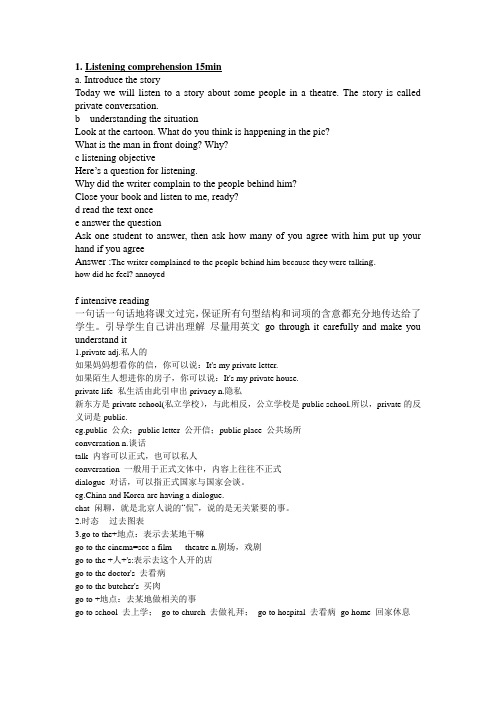
1.Listening comprehension 15mina.Introduce the storyToday we will listen to a story about some people in a theatre. The story is called private conversation.b understanding the situationLook at the cartoon. What do you think is happening in the pic?What is the man in front doing? Why?c listening objectiveHere’s a question for listening.Why did the writer complain to the people behind him?Close your book and listen to me, ready?d read the text oncee answer the questionAsk one student to answer, then ask how many of you agree with him put up your hand if you agreeAnswer :The writer complained to the people behind him because they were talkin g.how did he feel? annoyedf intensive reading一句话一句话地将课文过完,保证所有句型结构和词项的含意都充分地传达给了学生。
引导学生自己讲出理解尽量用英文go through it carefully and make you understand it1.private adj.私人的如果妈妈想看你的信,你可以说:It's my private letter.如果陌生人想进你的房子,你可以说:It's my private house.private life 私生活由此引申出privacy n.隐私新东方是private school(私立学校),与此相反,公立学校是public school.所以,private的反义词是public.eg.public 公众;public letter 公开信;public place 公共场所conversation n.谈话talk 内容可以正式,也可以私人conversation 一般用于正式文体中,内容上往往不正式dialogue 对话,可以指正式国家与国家会谈。
新概念第二课(第一课时)教案(精选五篇)

新概念第二课(第一课时)教案(精选五篇)第一篇:新概念第二课(第一课时)教案新概念第二册第一课《A Private Conversation》教案教案设计设计人:赖老师课题:A Private Conversation 课时:第一课时(40min),新授课(阅读)教学目标:1.熟读课文,掌握课文中的词汇与短语;2.了解在剧院看戏礼仪,培养良好情操。
教学难点:1.回顾与复习一般过去时;2.用英语话概况课文主要内容;3.go to the theatre 与 go to theatre的区别。
教学案例:T(T eacher)Ss(Students)T: Good afternoon, students!Do you like watching movies or plays? 大家喜欢看电影或者戏剧吗?Ss: Yes!T:(To show the posts of the latest movies)T: We call these “movie”.(T o learn the new word)Ss:(T o read after the teacher)T:(To show the posts of the four classical plays in Broadway)We call these “plays”.Ss:(To read after the teacher)T: Where do we watch the movies? Ss: 电影院、剧院T: cinema,theatre Ss:(To read after the teacher)T:(To introduce the Broadway)T: If we speak loudly in the theatre how would the other audiences think of us? 如果我们在剧院里面大声喧哗,周围的观众会怎么样看待你呢?Ss: 生气!会觉得你素质低!T: So everyone knows that the bad manner would bother the others, right? So the word “生气”in English we call “angry”.Ss:(To read after the teacher)T:(To learn and read thenew words and expressions)Ss:(To read after the teacher)T: Before reading our context, let’s think about these questions.The first, where did the writer go last week? The second, why did the writer complain about the people behind him? The third, what did the young man say to the writer? T:(To read the context or play the tape)T:(To ask volunteers to answer the questions)Ss: …… T: 我们想想课文中的第一句go to the theatre是什么意思? Ss: 嗯,应该是“去戏院”的意思。
新概念英语第二册第一课教案 (1)PPT课件

an informal talk in which people exchange news, feelings, and thoughts
12
• Theatre:
places to see a film, cinema
• Loudly:
adverb for loud, opposite to low
2
Good manners or not?
• Help the old people.
3
• Pick flowers in the park.
4
• Knock at the door before entering a room
5
• Spit
6
• Jump over the fence
7
• Throw rubbish onto the ground
Lesson 1 A private conversation
By Ariel 14.May,2012
1
Warming up
“Manners make the man.” 观其待人而知其人。 What should we do in public? What can’t we do in public?
13
• Attention: May I have your attention please?
notice
• Bear: I can’t bear it anymore.
to be so upset about something that you feel unable to accept it or let it happen; stand
新概念英语第二册Lesson1

Lesson 1 A private conversation一、教学时数3课时,120分钟二、教学对象初中一年级学生三、教学目标1、知识目标:⑴学生认读本课新单词和短语,并能够听写出来。
⑵学生能认读理解本课课文,并能够复述出本课的课文内容。
⑶学生能正确排列简单陈述句。
⑷学生可以分清主谓结构和主系表结构的句子。
⑸学生掌握形容词变副词的规律。
2、能力目标:⑴学生掌握陈述句语序的排列,能够说出正确的句子。
⑵学生能自主分析简单陈述句的句子结构及句型。
四、教学重点⑴认读理解本课新单词,短语和课文。
⑵掌握英语陈述句语序的排列:(时状)+主+谓+宾(宾补)+方状+地状+时状⑶区分主谓结构和主系表结构的句子。
⑷掌握形容词变副词的规律。
(adj.+ly----adv.)五、教学难点⑴新单词的正确发音(theater/θ/ bear/eə / attention/en/ angrily重音)⑵如何排列陈述句语序。
(主、谓、宾、方式状语、地点状语、时间状语)⑶区分主谓结构和主系表结构的句子。
六、教学评估⑴通过one by one认读新单词的方式,达到对新单词能准确发音的目的。
未听见有明显读错为合格。
⑵通过回答教师提问的方式,达到能掌握本课课文内容的目的。
能够正确回答问题为合格。
⑶通过教师说中文意思,学生回答英文单词的方式。
达到能准确说出新单词及记忆其中文意思的目的。
能够正确说出相应的英文单词为合格。
⑷通过提问学生教材14页表格中的句子是什么结构,表格中的单词或短语分别作什么成分,评估学生是否能区分主谓结构和主系表结构的句子以及是否掌握如何排列陈述句语序。
能正确说出句子结构、句子成分为合格。
七、教学资源教材《NEC-2》、音频、视频、单词卡片、QUIZ八、教学步骤步骤一:热身导入⑴教师向学生问好,自我介绍。
⑵介绍教材《NCE-2》及摘要写作的要求。
步骤二:单词、课文和语法点的学习1、单词学习:⑴教师让学生一个接一个地拼读新单词,教师听音纠正。
新概念2教案第一课word.doc
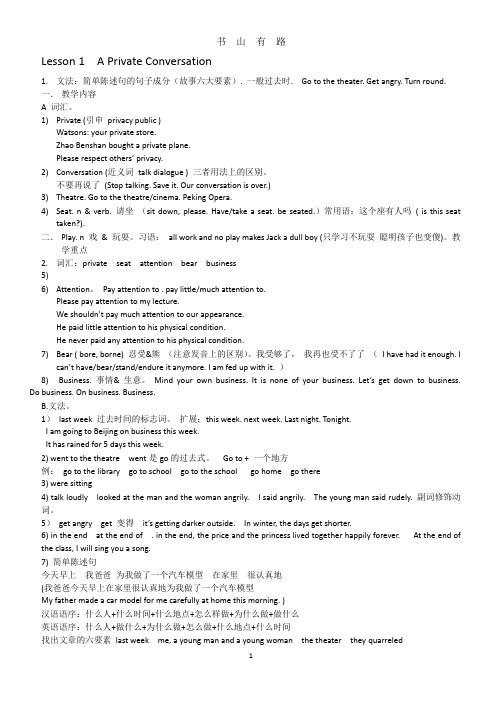
Lesson 1 A Private Conversation1.文法:简单陈述句的句子成分(故事六大要素). 一般过去时. Go to the theater. Get angry. Turn round.一.教学内容A 词汇。
1)Private (引申privacy public )Watsons: your private store.Zhao Benshan bought a private plane.Please respect others’ privacy.2)Conversation (近义词talk dialogue ) 三者用法上的区别。
不要再说了(Stop talking. Save it. Our conversation is over.)3)Theatre. Go to the theatre/cinema. Peking Opera.4)Seat. n & verb. 请坐(sit down, please. Have/take a seat. be seated.)常用语:这个座有人吗( is this seattaken?).二.Play. n 戏& 玩耍。
习语:all work and no play makes Jack a dull boy (只学习不玩耍聪明孩子也变傻)。
教学重点2.词汇:private seat attention bear business5)6)Attention。
Pay attention to . pay little/much attention to.Please pay attention to my lecture.We shouldn’t pay much attention to our appearance.He paid little attention to his physical condition.He never paid any attention to his physical condition.7)Bear ( bore, borne) 忍受&熊(注意发音上的区别)。
初中英语教案新概念2 lesson 1(学生版)-周媛(001)

新概念二 lesson 1一、根据课文内容回答下列问题。
1. Where did the writer go last week?.2. Did he enjoy the play?.3. Who was sitting behind him?.4. Were they talking loudly, or were they talking quietly?.5. Did the writer turn round or not?.6. What did he say?.二、根据答案,对本文章进行口头转述。
____________________________________________________________________________________________ ____________________________________________________________________________________________ ____________________________________________________________________________________________ ____________________________________________________________________________________________A private conversation1.private adj.①private letter②private lifeYao Ming doesn’t like to talk about his private life.③privacy n.隐私It’s my privacy.【扩展】:private school public school【翻译】粉丝们对明星的私生活很感兴趣,但明星们很渴望有自己的隐私空间。
新概念第二册第一课教案
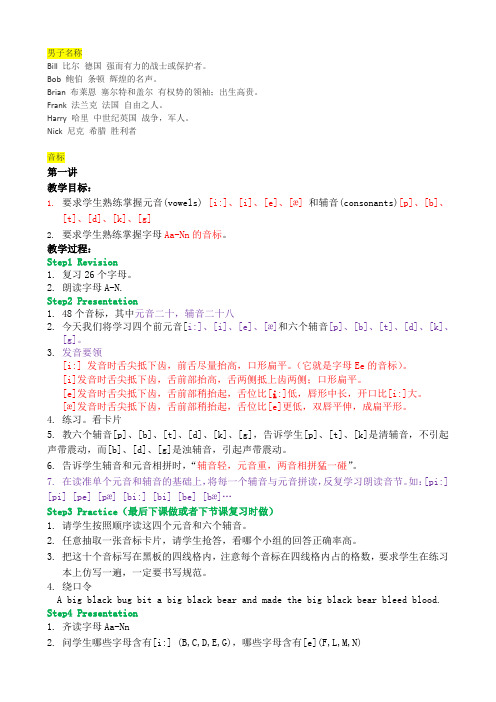
男子名称Bill 比尔德国强而有力的战士或保护者。
Bob 鲍伯条顿辉煌的名声。
Brian 布莱恩塞尔特和盖尔有权势的领袖;出生高贵。
Frank 法兰克法国自由之人。
Harry 哈里中世纪英国战争,军人。
Nick 尼克希腊胜利者音标第一讲教学目标:1.要求学生熟练掌握元音(vowels) [i:]、[i]、[e]、[æ]和辅音(consonants)[p]、[b]、[t]、[d]、[k]、[g]2.要求学生熟练掌握字母Aa-Nn的音标。
教学过程:Step1 Revision1.复习26个字母。
2.朗读字母A-N.Step2 Presentation1.48个音标,其中元音二十,辅音二十八2.今天我们将学习四个前元音[i:]、[i]、[e]、[æ]和六个辅音[p]、[b]、[t]、[d]、[k]、[g]。
3.发音要领[i:] 发音时舌尖抵下齿,前舌尽量抬高,口形扁平。
(它就是字母Ee的音标)。
[i]发音时舌尖抵下齿,舌前部抬高,舌两侧抵上齿两侧;口形扁平。
[e]发音时舌尖抵下齿,舌前部稍抬起,舌位比[i:]低,唇形中长,开口比[i:]大。
[æ]发音时舌尖抵下齿,舌前部稍抬起,舌位比[e]更低,双唇平伸,成扁平形。
4. 练习。
看卡片5. 教六个辅音[p]、[b]、[t]、[d]、[k]、[g],告诉学生[p]、[t]、[k]是清辅音,不引起声带震动,而[b]、[d]、[g]是浊辅音,引起声带震动。
6. 告诉学生辅音和元音相拼时,“辅音轻,元音重,两音相拼猛一碰”。
7. 在读准单个元音和辅音的基础上,将每一个辅音与元音拼读,反复学习朗读音节。
如:[pi:] [pi] [pe] [pæ] [bi:] [bi] [be] [bæ]…Step3 Practice(最后下课做或者下节课复习时做)1.请学生按照顺序读这四个元音和六个辅音。
2.任意抽取一张音标卡片,请学生抢答,看哪个小组的回答正确率高。
新概念英语第二册第一课教案
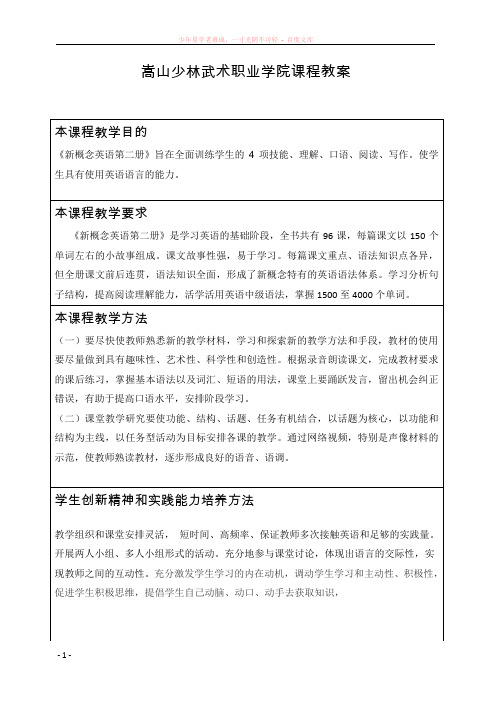
18、private私人的,反义词是public公开的
举例:private letter私人信件- public letter公开信
private school私立学校- public school公立学校
19、conversation一般用于正式文体中,但谈话的内容往往不很正式。
爸爸送给我一辆自行车。Father gave me a bike.
他让我笑了。He made me laughing.
汉语的语序:什么人+什么时间+什么地点+怎样做+为什么做+做什么
例句:我爸爸今天早上在家里很认真地为我做了一个汽车模型。
英语的语序:什么人+做什么+为什么做+怎样做+什么地点+什么时间
12、in the end = at last到最后。in the end of …在…的末尾,可以指时间也可以指空间。
13、I could not bear it!我实在受不了了!这是一句非常有用的习惯用语。
bear = stand忍受、容忍。it代指这整件事。
14、again再一次,又一次。例句:I’m sorry. Can you say it again? I can’t follow you.
10、I looked at the man and the woman angrily.这里的angrily是副词,修饰look at这个动作。
see看见,及物动词,强调结果,see sb./sth.
look看,不及物动词,强调动作,look at sb./sth.
11、They did not pay any attention.这句话之前可以加上连词But。这是个省略句,省略了to me。
新概念第二册第一课详细教案
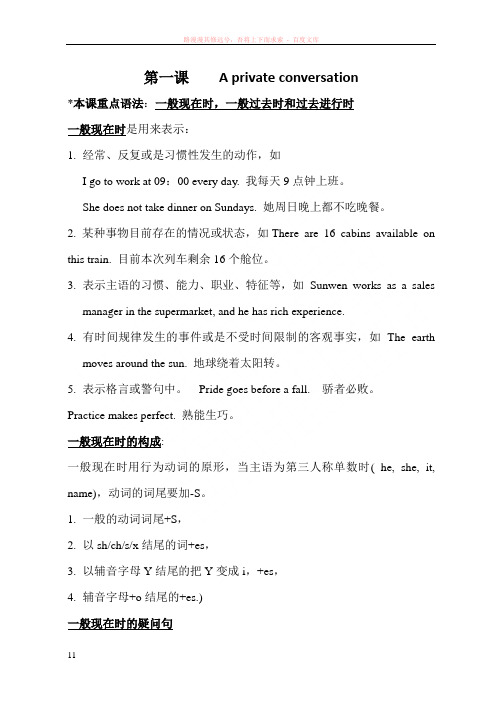
第一课 A private conversation*本课重点语法:一般现在时,一般过去时和过去进行时一般现在时是用来表示:1.经常、反复或是习惯性发生的动作,如I go to work at 09:00 every day. 我每天9点钟上班。
She does not take dinner on Sundays. 她周日晚上都不吃晚餐。
2. 某种事物目前存在的情况或状态,如There are 16 cabins available on this train. 目前本次列车剩余16个舱位。
3.表示主语的习惯、能力、职业、特征等,如Sunwen works as a salesmanager in the supermarket, and he has rich experience.4.有时间规律发生的事件或是不受时间限制的客观事实,如The earthmoves around the sun. 地球绕着太阳转。
5.表示格言或警句中。
Pride goes before a fall.骄者必败。
Practice makes perfect. 熟能生巧。
一般现在时的构成:一般现在时用行为动词的原形,当主语为第三人称单数时( he, she, it, name),动词的词尾要加-S。
1.一般的动词词尾+S,2.以sh/ch/s/x结尾的词+es,3.以辅音字母Y结尾的把Y变成i,+es,4.辅音字母+o结尾的+es.)一般现在时的疑问句助动词DO或Does+主语+动词原形+其它成分。
如Do I look okay? 我看起来还行吗?Does she speak English? 她学英语吗?一般过去时表示过去某个时间发生的动作或存在的状态,通常我们讲述一件过去发生的事情会用这个时态。
动词过去式变化规则:1.一般在动词末尾加-ed,如:pull-pulled, cook-cooked2.结尾是e加d,如:taste-tasted3.末尾只有一个元音字母和一个辅音字母的重读闭音节,应双写末尾的辅音字母,再加-ed,如:stop-stopped4.以“辅音字母+y”结尾的,变y为i,再加-ed,如:study-studied 5.不规则动词过去式:am,is-was are-were, do-did, see-saw, say-saidgive-gave, get-got, go-went, come-came, have-had,eat-ate, take-took, run-ran, sing-sang, put-put,make-made, read-read, write-wrote, draw-drew, drink-drank,fly-flew, ride-rode, speak-spoke, sweep-swept, buy-boughtswim-swam, sit-sat bring--brought can-could cut-cutbecome-became begin-began draw-drew feel-felt find-foundforget-forgot hear-heard keep-kept know-knewlearn-learnt (learned)leave-left let-let lose-lostmeet-met read-read sleep-slept speak-spoke take-tookteach-taught tell-told write-wrote wake-woke think-though练习:一、用be动词的适当形式填空。
- 1、下载文档前请自行甄别文档内容的完整性,平台不提供额外的编辑、内容补充、找答案等附加服务。
- 2、"仅部分预览"的文档,不可在线预览部分如存在完整性等问题,可反馈申请退款(可完整预览的文档不适用该条件!)。
- 3、如文档侵犯您的权益,请联系客服反馈,我们会尽快为您处理(人工客服工作时间:9:00-18:30)。
Lesson 1 A Private Conversation一.教学重点1. 词汇。
2. 语法。
句子结构(主谓宾定状补、主系表)缩句理解一般过去时。
二.简单陈述句今天早上我爸爸为我做了一个汽车模型在家里很认真地(我爸爸今天早上在家里很认真地为我做了一个汽车模型My father made a car model for me carefully at home this morning. )三、A 单词。
1) Private (引申privacy n.---- public )Zhao Benshan bought a private plane.Please respect others’ privacy.2) Conversation (近义词talk dialogue )in conversation 在谈话;交谈中telephone conversation 打电话man-machine conversation 人机对话private conversation 私人通话eg. You will have a great conversation and maybe even get a date or make a new friend.3) Theatre. Go to the theatre/cinema. Peking Opera.4) Seat. n & verb. 请坐(sit down, please. Have/take a seat. beseated.)常用语:这个座有人吗( is this seat taken?).1. seat和sit作为动词,都可以表示“坐”的意思。
(1) seat是及物动词,常以被动形式表示主动意义。
如:He is seated between Jack and Tom.她坐在杰克和汤姆之间。
Please be seated. (=Please seat yourself.) 请坐。
(2) sit通常作不及物动词用。
如:The students are sitting at their desks.学生们正坐在课桌旁。
Sit down, please. 请坐。
2. seat还可作名词用(而sit只能作动词用),常见短语take a seat (相当于have a seat或take one's seat) ,意为“坐下,就座”。
如:Take your seat, please. 请就坐。
5) Play. n 戏& 玩耍。
习语:all work and no play makes Jack adull boy (只学习不玩耍聪明孩子也变傻)。
Plays an important role in。
6) Attention。
Pay attention to . pay little/much attention to.Please pay attention to my lecture.We shouldn’t pay much attention to our appearance.He paid little attention to his physical condition.He never paid any attention to his physical condition.7) Bear ( bore, bor ne) 忍受&熊(注意发音上的区别)。
我受够了,我再也受不了了(I have had it enough. I can’t have/bear/stand/endure it anymore. I am fed up with it厌倦了. )8) Business. 事情& 生意。
Mind your own business. It is none ofyour business. Let’s get down to business.Do business. On business. Business.四、词法1.大部分直接加ly。
如quick---quickly2.以“y”结尾的,先将“y”改成“i”,再加“ly”,如happy---happily3.还有很多是形容词副词同形的,如best,better,bright,cheap,clear,close,deep,direct,early,fair,far,fast,ful l,hard,high,ill,just,late,long,loud,low,near,right,sharp,slow,soft,straig ht,well,wide,wrong4.少数以不发音的e结尾的形容词,和以-ue结尾的形容词,要去掉e再加-ly。
例如:true-truly possible—possibly gentle-gently.等。
但绝大多数以e结尾的形容词仍然直接加-ly。
例如:polite-politely, wide-widely等。
5.在形容词词尾直接加-ly。
如:real-really; helpful-helpfully;careful-carefully; hopeful-hopefully; slow-slowly; quick-quickly; quiet-quietly6.副词还可以由形容词加前缀a-得来,如:loud (adj.)-aloud (adv.)7.需注意: friendly; motherly; lovely等词是形容词而非副词。
在英语中,有些词既可以作形容词,又可以作副词,如early, much, fast, little, wide, loud等。
由于这类词词性虽不同,但词形却一样。
例句:Thank you very much. (adv.) 多谢。
There is much water in the river. (adj.) 河里有很多水。
The music is too loud. Please turn it down. (adj.) 音乐声太大,请调低点。
He speaks loud enough. So everyone in the room can hear what he said. (adv.) 他说话的声音很大,所以房间里每个人都能听到他的话。
及物动词,不及物动词Lesson1. 1. (b) 2. (c) 3. (b) 4. (d) 5. (c) 6. (a) 7. (d) 8. (b) 9. (a) 10.(c) 11. (c) 12. (c)ON强调两物体是接触的,在上面~ABOVE不接触的~其实ON和ABOVE来比较意义不大,ABOVE和OVER比较比较重要:on,over和above的用法区别1)on表示在一物体上,强调两物相接触,over也表示在一物体上,但强调覆盖这一物体。
试比较:① She put her coat on the bed. 她把大衣放在床上。
② She put her coat over the sleeping baby.她把大衣盖在那正在睡觉的孩子身上。
▲如果要表示“覆盖”或“越过”,则用over。
如:③ There\'s thick cloud over the south of England.英格兰南部地区一片乌云。
④ Electricity cables went over the fields.电缆线越过田野。
(这句也可以用across)▲指数量时,我们一般用over(=more than)表示“超过”,但如果指上下垂直的度量以及海拔高度时,要用above。
试比较:⑤ You have to be over 18 to see this film.你得超过十八岁才能看这部电影。
(不用above)⑥ The temperature is three degrees above zero.温度在零上三度。
(不用over)⑦ The mountain is over(=more than)4,000 metres above (higher than) sealevel.那座山海拔有四千多米高。
▲over表示在某人或某物的正上方,反义词是under。
above表示位置高于某人或某物。
但不一定是正上方,反义词是below.情态动词有四类:①只做情态动词:must,can(could),may(might)②可做情态动词又可做实义动词:need,dare③具有情态动词特征:have(had,has) to,used to,ought to④情态动词表猜测:一肯一否三不定(must一肯,must not一否,can,could,would三不定。
)注:mustn't代表强烈禁止must表示主观,have to表示客观过去时态1)last week 过去时间的标志词。
扩展:this week. next week. Last night. Tonight.I am going to Beijing on business this week.It has rained for 5 days this week.2) went to the theatre went是go的过去式。
Go to + 一个地方例:go to the library go to school go to the school go home go there3) were sitting4) talk loudly looked at the man and the woman angrily. I said angrily. The young man said rudely. 副词修饰动词。
5)get angry get 变得it’s getting darker outside. In winter, the days get shorter.6) in the end at the end of . in the end, the price and the princess lived together happily forever. At the end of the class, I will sing you a song.。
